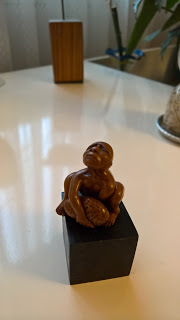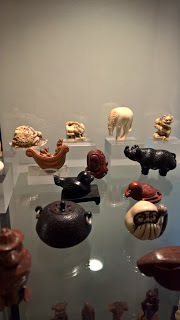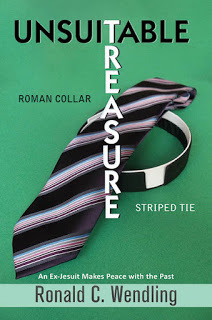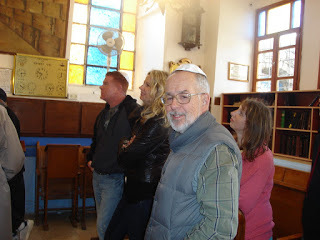One Benefit of Memoir Writing by Ronald Wendling
 I have just finished reading Edmund de Waal’s well known and illuminating book,
The Hare with Amber Eyes
. The title refers to the name of a netsuke, one of those wood or ivory carvings originating in Japan that became all the rage in late nineteenth-century Europe. De Waal lavishes loving attention on the 264 netsuke collected by his well-to-do ancestor, Charles Ephrussis, during the height of the fashion for things Japanese (japonisme) in the Paris of the 1870s. Other nesuke in Charles’s collection included “three toads on a leaf,” “priest on a horse,” and “a couple making love.” The one pictured on the right might be called "man trying to lift a stone." It may surprise those who read de Vaal’s re-creation of Charles Ephrussis’ Paris to learn that some of their favorite Impressionist painters, Degas and Renoir for example, could be actively anti-Semitic and that the character of Swann in Marcel Proust’s
Remembrance of ThingsPast
was presumably modeled, at least in part, on Charles Ephrussis. Charles gave his nesuke collection to the family of his cousin Viktor in Vienna who lived, we discover, not far from Sigmund Freud’s apartment.
I have just finished reading Edmund de Waal’s well known and illuminating book,
The Hare with Amber Eyes
. The title refers to the name of a netsuke, one of those wood or ivory carvings originating in Japan that became all the rage in late nineteenth-century Europe. De Waal lavishes loving attention on the 264 netsuke collected by his well-to-do ancestor, Charles Ephrussis, during the height of the fashion for things Japanese (japonisme) in the Paris of the 1870s. Other nesuke in Charles’s collection included “three toads on a leaf,” “priest on a horse,” and “a couple making love.” The one pictured on the right might be called "man trying to lift a stone." It may surprise those who read de Vaal’s re-creation of Charles Ephrussis’ Paris to learn that some of their favorite Impressionist painters, Degas and Renoir for example, could be actively anti-Semitic and that the character of Swann in Marcel Proust’s
Remembrance of ThingsPast
was presumably modeled, at least in part, on Charles Ephrussis. Charles gave his nesuke collection to the family of his cousin Viktor in Vienna who lived, we discover, not far from Sigmund Freud’s apartment.
 Nesuke were kept in glass cases called vitrines. The ones to the right, like the one above, are from the collection of David and Ruth Berman, friends of my wife and I.
Nesuke were kept in glass cases called vitrines. The ones to the right, like the one above, are from the collection of David and Ruth Berman, friends of my wife and I.The Ephrussis originally made their money on grain and banking in Odessa before branching westward to Paris and Vienna. By far the most painful part of de Waal’s narrative comes when Hitler’s brown shirts arrive in Vienna in March of 1938, the year before I was born, and begin their raids on the Ephrussis family home there, dutifully recording item by item the valuables they are confiscating. “Jews matter less,” as de Waal puts it, “than what they once possessed.” But the reader can feel all this coming much earlier in the century as World War I begins, the Austrian Empire collapses, and Hitler begins his rise to power. Fortunately, the Vienna Ephrussis had a non-Jewish maid named Anna who held onto their 264 nesuke and safely returned them to a grown daughter of the family, Elizabeth de Waal, who had played with them when she was a little girl. Elizabeth and her husband had by that time become British citizens.
 From Elizabeth the nesuke passed to her brother Ignace (Iggie more familiarly) who had left Vienna for America, worked for a time in New York City and Hollywood, then took up residence in postwar Japan. Like Anna, Iggie kept the nesuke safe until Jiro, his partner, willed them to Edmund de Waal, who now keeps them in his family home in London.
From Elizabeth the nesuke passed to her brother Ignace (Iggie more familiarly) who had left Vienna for America, worked for a time in New York City and Hollywood, then took up residence in postwar Japan. Like Anna, Iggie kept the nesuke safe until Jiro, his partner, willed them to Edmund de Waal, who now keeps them in his family home in London.My own memoir, Unsuitable Treasure: An Ex-Jesuit Makes Peace with the Past , by no means primarily concerns anti-Semitism, but writing it forced me into an early mention of my grandmother’s and my father’s occasional outbursts of contempt for Jews. I loved my grandmother and my father and still do. But the way fierce prejudice was mixed into their many good qualities reminds me of how complex we human beings are and how delicate is the task of estimating anyone’s character accurately.
Besides being both a meticulous researcher of his family history and a superb writer, Edmund de Waal is also a British potter who works in porcelain. His book is not so much a memoir as an extensive history of the survival of his family members, at least most of them.
 To the right is a photo of me in a synagogue in Israel several years ago wearing a skull cap. Those interested in Edmund de Waal's Hare With the Amber Eyes will find more information about him and his book here and here.
To the right is a photo of me in a synagogue in Israel several years ago wearing a skull cap. Those interested in Edmund de Waal's Hare With the Amber Eyes will find more information about him and his book here and here.-- Ronald Wendling
Published on February 22, 2016 22:00
No comments have been added yet.



